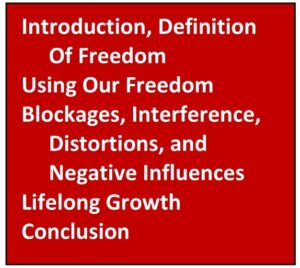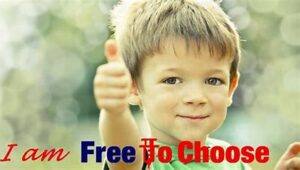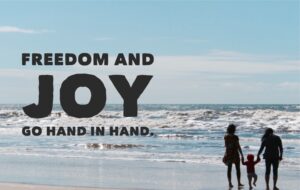Freedom: Use and Blockages (Part I)
INTRODUCTION, DEFINITION OF FREEDOM
In the February 2022 Letter we said that freedom is having the opportunity to make choices. We mentioned that we can fail to take advantage of the opportunity. Do we always have a choice? Yes, life always presents us with choices but we may not like the choices that we have or the situations we find ourselves in. It takes courage and self-discipline to use our freedom and to overcome the many challenges that freedom presents to us. As we explore the blockages to using our freedom we are exploring some of the challenges. Overcoming the blockages is challenging.
USING OUR FREEDOM
The process of using our freedom consists of four steps. First is seeing that we have a choice. If we don’t see that we have a choice using our freedom is impossible. Next is taking the opportunity to make a choice. The third step is to evaluate and weigh our alternatives, our choices. Finally we make a choice. Hopefully we make a choice that is in our best interests.
see that we have a choice using our freedom is impossible. Next is taking the opportunity to make a choice. The third step is to evaluate and weigh our alternatives, our choices. Finally we make a choice. Hopefully we make a choice that is in our best interests.
To make the best use of our freedom we need be willing to see that we have a choice. Sometimes we may not be willing. We need the ability to clearly see what alternative choices exist for us in the moment of choice. This is an ability to accurately perceive aspects of our reality, aspects of our life. Then we need to be able to objectively evaluate those alternatives. We accomplish this using our ability to be objective and to understand the consequences of our choices. Once we have clarity about our choices we can then make good choices, choices that truly benefit us. Sometimes we do not know what a good and beneficial choice is.
What interferes with our willingness to see the choices that we have? What interferes with our ability to objectively evaluate our alternatives and choices? Finally what interferes with making the right choice, a choice that is in our best interest? We will examine what interferes and mention ways to have freedom from these interfering factors. We could say we have freedom to and need to have freedom from, freedom to create the future we want and freedom from what prevents us from using our freedom effectively. We will focus on the personal blockages, restrictions, distortions, and negative influences which limit our ability to use our freedom.
and choices? Finally what interferes with making the right choice, a choice that is in our best interest? We will examine what interferes and mention ways to have freedom from these interfering factors. We could say we have freedom to and need to have freedom from, freedom to create the future we want and freedom from what prevents us from using our freedom effectively. We will focus on the personal blockages, restrictions, distortions, and negative influences which limit our ability to use our freedom.
Point Of Empowerment: There are two kinds of freedom, freedom to and freedom from.
BLOCKAGES, INTERFERENCE, DISTORTIONS, AND NEGATIVE INFLUENCES
There is a long and complicated list of blockages, interference, distortions, and negative influences that interfere with our ability to use our freedom effectively. (We will just call them blockages for short.) In this Letter we can only begin to identify and describe them. Because this a long list it takes a lifetime to remove these blockages. With so many issues we can see why using our freedom effectively is such a challenge. Let’s begin.
- Limiting beliefs. Beliefs are ideas about how we and the world work. The primary limiting belief is: “I am a victim of life, a life without choices and therefore a life without freedom.” Also, “I do not deserve freedom. I am not worthy or have not earned my right to freedom because I have low self-esteem.” Another belief is, “I never get what I want.” These beliefs inhibit our ability to see the choices we have. Also, the belief “I never get what I want” will push us to make choices that will produce the repeating experience of “I never get what I want.” Identify and change limiting beliefs. (See March 2018 to begin reading the series of Letters about beliefs. https://iifsd.org/library/newsletters/march-2018-letter/)
- The past. If we are not free from the influences of past we project them into our future by making choices that will create new situations that repeat past situations. “My experience has been that my friendships don’t last. I find myself choosing friends who are not loyal and then continue to experience friendships that don’t last.” Free yourself from the past by seeing that you reproduce it in the future. Make different choices.
- A common influence from the past is guilt. We have done something that we believe to be wrong, hold ourselves responsible, feel guilty, and have not forgiven ourselves for our behavior. Guilt can result in a tendency to punish oneself so when faced with choices between something positive and something negative we will choose the negative to punish ourselves. Guilt also results in feelings of not deserving. We can be blind to our choices and make poor choices out of feeling not deserving. Identify your guilt and forgive yourself.
- Trauma is created by single or repeating experiences of great pain. Under the influence of trauma we must make choices that keep us safe. “Must” is a compulsion that determines how we see our alternatives and what we have to choose. “I choose to avoid new situations even though they seem worthwhile because newness makes me feel unsafe. I keep it safe.” Identify and heal trauma.
- Issues are the result of painful childhood experiences that give rise to limiting beliefs. For example: “I was frequently angry at my father and argued with him. He died when I was nine years old. I was told that stress kills you. I decided that my anger killed him because it caused him a lot of stress. Even though situations naturally provoke my anger, I choose to avoid feeling angry so I don’t hurt anyone. Anger/no anger, I always choose no anger. This make me inflexible and limits my choices.” Identify and resolve issues.
- Family issues. Family issues are conflicts that exist for many years and distort family relationships. “My father and uncle have fought bitterly for many years. Even though I really like my uncle I choose to stay away from him to please my father. I have only one choice regarding my uncle—stay away. I am not free to have the relationship I want with him.” Identify and resolve family issues.
- Transference is taking thought, feelings, beliefs, and expectations from one situation or relationship and putting them onto another situation or relationship where they do not apply. “I got severely punished if I argued with my father. I now avoid arguing with my boss who is an authority figure like my father. I am not free because I always choose “no conflict” though conflict with my boss may be necessary at times.” Identify and resolve transferences.
- Childhood inner conflicts brought into adulthood. Inner conflict creates confusion about what choices are right. “Growing up I always wanted to please my friends so I agreed to do things I did not want to do. My conflict—please my friends or please myself. I still can’t resolve this conflict.” Identify and resolved childhood conflicts.
- Value conflicts. Value conflicts create confusion about what choices are right. “I value my alone time and I value the time I spend with others. But I often feel a conflict about which to choose because I don’t know what I want. I get confused and upset and don’t know what I should choose to do.” Get to know yourself better, what you want, so you can see priorities. Or “I want to do the right thing and visit my mother. I value doing the right thing. But I know we fight all the time so I don’t want to visit my mother. I value my peace of mind. I feel conflicted and get confused about what is the right choice. ” Identify and resolve value conflicts.
- Self-destructiveness. A wide range of self-destructive behaviors limit our ability to choose because as we inflict pain on ourselves our ability to think and feel is diminished. We retreat in pain and can’t see alternatives or evaluate the ones we do see objectively. Self-destructiveness can also be an “I must,” behavior. “I must” eliminates choice. Identify and stop self-destructive behavior.
- Blocks to our success. Certain beliefs block our success. These beliefs “program” the subconscious mind in a way that limits our choices. “My parents had low paying jobs. I believe that “people like us don’t earn much money.” I choose low paying jobs though I have opportunities to earn more money.” Identify and resolve blocks to your success.
- When we are in a “trap” we feel that we do not have any freedom because we can’t see any alternative to what we are experiencing. We think that we have no choice. “I feel trapped working at a job I don’t like.” “I feel trapped in a relationship that is unfulfilling.” “I feel trapped living in a city when I want to live in the suburbs.” We may feel trapped by a set of circumstances and this may be true. But most traps are caused by limiting beliefs. One example of a limiting belief is, “I don’t deserve better than I have now.” Identify and free yourself from traps by changing the beliefs that cause the trap.
Point of Empowerment: In order to change the blockages that restrict our freedom we first must recognize them and acknowledge ownership of them. You have to own it to change it. Resolving these blockages, freeing ourself from them, is not easy and can be a lifelong process.
LIFELONG GROWTH
What kind of life long growth processes lead to increased freedom? These are the processes of growing, developing, maturing, and evolving. Accomplishing each includes clearing the blockages to using our freedom. Clearing the blockages to freedom facilitates growing, developing, maturing, and evolving. These are “big picture” categories.
- Growing is the process of becoming more, of having more of you, the positive and negative aspects of you.
- Developing is the process of developing our abilities into skills and our skills into mastery to accomplish our life tasks.
- Maturing is the process of enhancing who we are as a person so we can see the world from new perspectives, new points of view. We also expand what we are capable of achieving.
- Evolving is the process of changing our mastery into artistry and our perspectives into wisdom. It is the process of expanding our consciousness through the combination of growing, developing, and maturing.
Practice: Make a decision to grow, develop, mature, and evolve consciously with awareness and responsibility.
Practice: Take these actions: accomplish life’s developmental tasks, develop loving relationships, become aware of yourself and reflect, be responsible and take charge of your life, have fun, experience pleasure, recognize you strengths and weaknesses, become the best person you can be, make a contribution, explore, discover, and understand yourself, heal traumas, seek to grow spiritually, go for therapy, get some coaching, read personal growth books and put those ideas into action, read great literature, join discussion groups, attend workshops, and talk to others about your growth and development.
CONCLUSION
In this Letter, we explored some aspects of freedom: it’s definition, use, blockages to using freedom, and some ideas about clearing these blockages. In the June Letter we will explore additional blockages and more ideas to free ourselves from them. We can use our freedom to feel better and be happier, to claim our right to life, liberty, and the pursuit of happiness, and to create the life we want. But we must overcome the blockages along the way.
